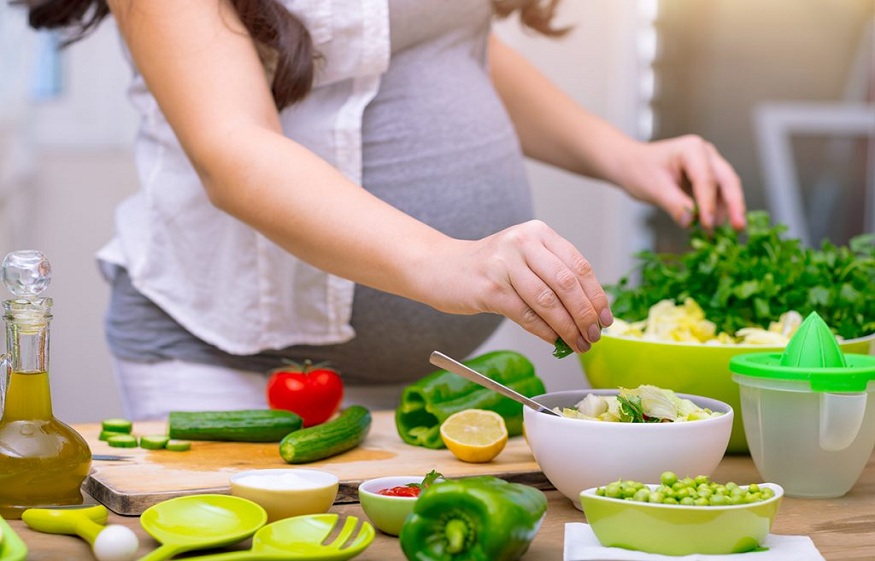Vegetarian diet during pregnancy
The vegetarian diet is not incompatible with pregnancy. On the contrary, it can be beneficial for the mother and the fetus as long as there is adequate medical control. It is therefore amplified with iron, folic acid, and vitamin B12.
Women’s power is one of the critical issues when getting pregnant and making the future baby is born healthy. Eating a balanced diet, not consuming tobacco or alcohol, and avoiding a sedentary lifestyle are some of the guidelines that any pregnant woman must follow strictly for nine months. And precisely those requirements are usually part of the alphabet of people who define themselves as vegetarians. For a pregnant woman, following a strict diet plan free of meat and fish is not that unusual.
Quite the contrary, since several studies confirm that the vegetarian diet is fully compatible with pregnancy. Some researchers made a systematic review about the dietary plan for pregnant women: in which it is concluded that such type of diet is suitable during pregnancy, as long as it pays enough attention to the consumption of specific vitamins and minerals”, says Eduard Baladia, coordinator of the Center for the Analysis of Scientific Evidence of the Spanish Foundation of Dietitians-Nutritionists.
The recent studies conducted came up to the same results as the united states academy of Nutrition and Dietetics, whose position is to ensure that a well-planned vegetarian diet can be suitable and provide essential benefits at all life stages, including pregnancy and lactation.
Vegetarian diet, yes, but varied and balanced.
Medical Specialists agree with the fact that keeping a well balanced diet helps pregnant women to receive all the nutrition that she needs during her pregnancy.
A well-known Medical Expert clarifies that during the pregnancy of a woman. If a woman follows a balanced diet plan then it will help her to better absorb certain nutrients. Results in helping her improve physiological behavior and the body will become more efficient. In the end, there will be no nutritional deficiencies that endanger the health of the baby.
The nutritional needs will depend a lot on the type of vegetarian diet that the woman follows. However, the vegetarian diet is strict, one that is based on the consumption of plant products and that excludes foods from animals. It is true that within this concept, different categories are depending on how strict the guidelines to follow are. There are several other diets that can be distinguished. The most common amongst them are three.
- Ovolactovegetarianos: do not eat meat or fish, but eat eggs and dairy products.
- Lacto-vegetarians: This dietary plan eliminates meat, fish, and eggs from their diet, although they do consume dairy products and their derivatives.
- Strict Vegans: Their diet does not include any foods derived from animals, such as eggs or dairy.
Food supplements in the diet of the pregnant vegetarian
Although the vegetarian diet is suitable during pregnancy, it is essential that the woman let her gynecologist know the type of diet she is following. This professional will be in charge of determining whether it is necessary to include nutritional supplements and do a specific follow-up or not. So, without reasonable obstetric control. It will be crucial for both the woman and the baby. That is the only reason, during pregnancy, it is essential to have complete nutrition. But as long as the gynecologist’s recommendations are followed and special attention is paid to certain vital nutrients, the vegetarian diet can provide women with all the necessary nutrients.
As with any pregnant woman, during the nine months of pregnancy, it is necessary to increase the caloric intake as the weeks go by about 100 calories during the first trimester and about 300 calories during the second and third, but without the need to eat in excess, but through a healthy and varied diet.
B12, an essential supplement for pregnant vegetarians
However, unlike other pregnant women, in pregnant women who follow a vegetarian diet, particular emphasis must be placed on vitamin B12 since it is found naturally in animal-origin foods, mainly in red meat. In these cases, where the pregnant woman excludes meat from her usual diet, “the intake of a daily vitamin B12 supplement is recommended since there are no plant foods considered reliable sources of this vitamin; the milk and eggs contain vitamin B12, but if their intake is limited only to these foods, a lower amount is obtained needed for proper fetal development.
For this reason, “either dietary supplements are prescribed to women, or the diet is implemented with foods enriched with this vitamin, such as soy or enriched cereals.” Along these lines, Baladia recalls that “in pregnant vegetarians, the precautionary principle leads us to supplement vitamin B12, both for those who follow a strict vegan diet and for those who are ovo-lacto-vegetarian, since the risk-benefit ratio encourages us to it”.

